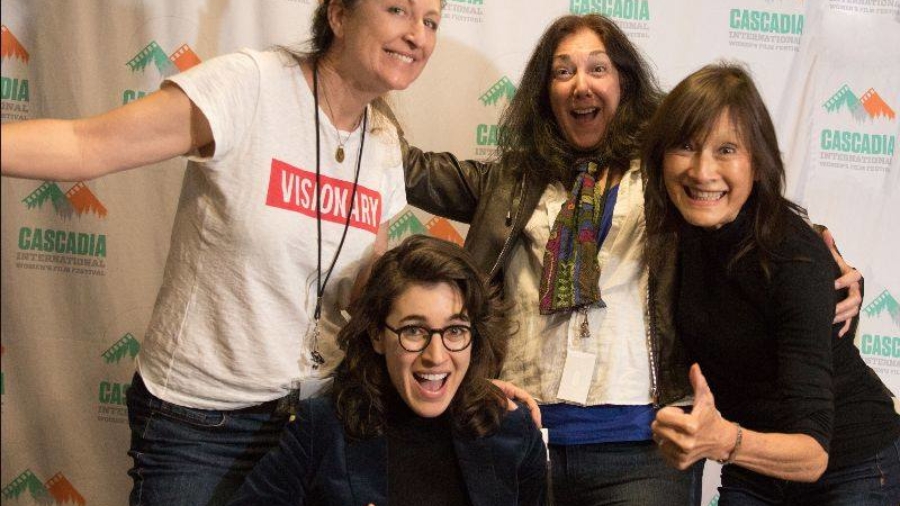Written by Melanie Carden
Women were the original power-houses in the movie industry. In the 1920’s, before the talkies, women the likes of Louis Weber, Dorothy Parker, Marion Wong and many others largely created the industry in its original storytelling form. This was before the mainstream saw the potential for profit—then they were silenced and sidelined in terms of story creation and production. Hollywood film has been dominated by male-centric directors and influencers since that time but women have long been battling their way back. There are but a few film festivals devoted to women directors—Cascadia International Film Festival (Bellingham, WA) is one of the beacons that helps guide women directors in their efforts to dismantle the celluloid ceiling.
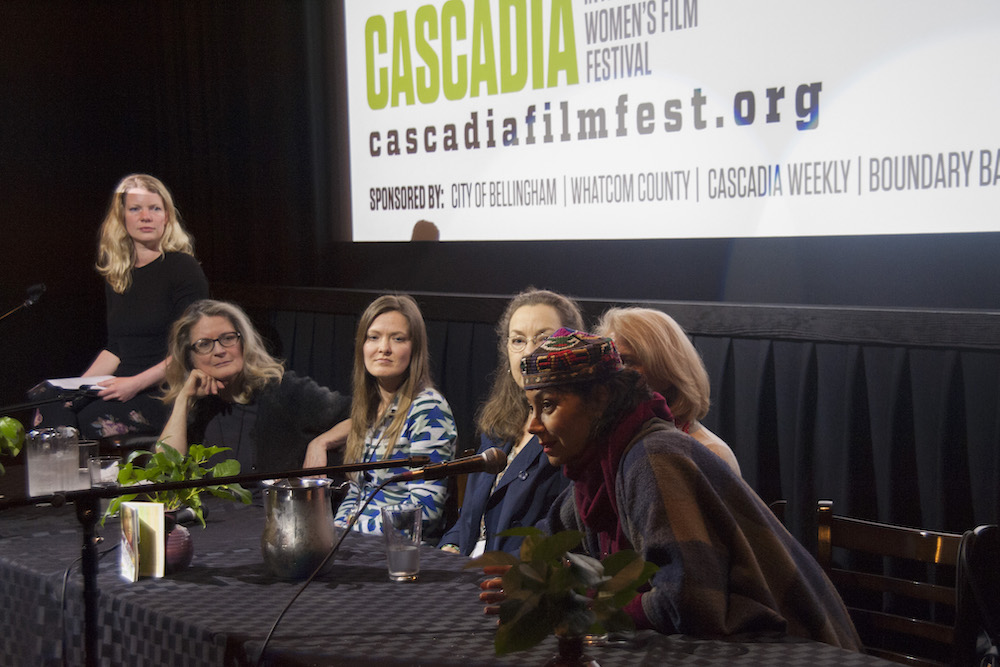
Documentary editing discussion panel at Cascadia Women’s Film Festival.
The festival got started in 2015 as a part of Pickford Film Center’s “Doctober” Documentary Film Festival in Bellingham. By 2017, its organizers were ready to launch their own festival. In its “Doctober” days, only 7% of the top 100 grossing films were directed by women and only 9% of the top 250 (Lauzen). The Cascadia team has focused, organized, and rallied around the mission of changing these restrictive realities through unparalleled outreach, networking, and community.
Cheryl Crooks, director of the festival, began her career as a journalist and arts critic in Phoenix before ultimately writing for Time Magazine for ten years. In that decade, she covered everything from the first artificial heart transplant to Presidential elections to the Los Angeles Olympics. In her role as festival director, she draws on her extensive journalism expertise as well as her varied arts-community board positions. With equal parts determination and heart, she insists that, “one thing that’s critical is that the films women make and the stories they tell receive widespread recognition. Women need to be given the opportunities to make those stories [and] someone needs to show those films.”
When women were at the helm in the 1920’s, there wasn’t yet much profit. It was about the craft of film making and story rooted in non-male perspectives. In her recent book, The Wrong Kind of Women: Inside Our Revolution to Dismantle the Gods of Hollywood, and subsequent Atlantic article, Naomi McDougall Jones remarks that “the early period of cinema was rich with opportunity for what critics would now call independent film, and opportunities at the grassroots level and on the fringes provided fertile ground for different types of voices to emerge.” This insight hits on the heart of the matter.
Within a decade of World War I ending—and with advancing technology in the industry—movie-making shifted from artistic hobby to investment and profit opportunity. When women were evicted from behind the camera, men took over. Yes, many extraordinary movies have been made since. But directors—male and female—bring to the role their own worldview. This impacts and sways the story, adding a sometimes invisible coded fingerprint. The scarcity of female directors, and lack of recognition for women who are in these roles, shifts the needle of mainstream culture. This lopsided-ness holds true in the film critique industry as well with men holding the lion’s share at 71% of total film critic positions (SDSU, Lauzen).
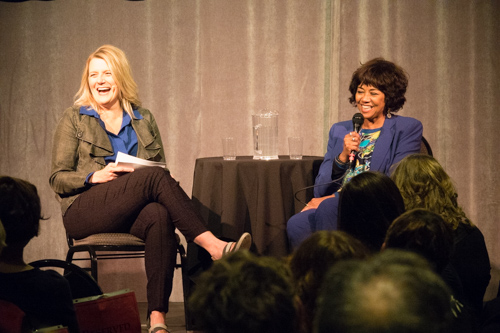
Cheryl Boone Isaacs and Deb Slater during a panel discussion at Cascadia Women’s Film Festival.
When our view of the world is not projected onto the screen and critically reviewed by men and women alike, we become invisible and young girls are shut out of a modern day inspiration-incubator. To this point, three men I recently interviewed named Marvel movies as the genesis of their inspiration for movie directing and film analysis. Young girls deserve parity in cinematic-inspiration, and Cascadia is working tirelessly to level the playing field.
Set in Bellingham, WA, the festival helps female directors pursue their dreams at the highest level through educational programming, discussion panels, Q&A with established directors, and a curated community of networking and support. When asked what differentiates Cascadia from other festivals, two-time Emmy winning director Mary Lou Belli remarks, “The stunning town, the friendliness of the participants, but most important: the programming. At this fest, there is an encouraging atmosphere among sophisticated viewers and a wonderful opportunity for filmmakers to network and grow.”
In 2019, Cascadia screened 37 films over four days’ time in addition to their signature networking and social events, workshops, industry panels, educational forums. That year the Honored Guest was Academy Award-winning documentary director Freida Lee Mock, who most recently premiered her documentary RUTH: Justice Ginsburg In Her Own Words (available online) . In 2019, she presented a screening of her film “Anita: Speaking Truth to Power.” She says Cascadia, “is different from other festivals in that it is focused on an International perspective on women filmmakers with the goal of being THE International Women’s Festival on par with top festivals like Sundance, Tribeca etc.” Last year, after being adjusted for the pandemic, Cascadia offered thirty films from twelve different countries of origin. The international nature of the festival speaks, not just to its reach, but to its commitment to embracing, celebrating, and learning from women’s stories with the widest possible lens. Crooks explains that, “having jurors based all over the world was intentionally done in order to give the festival an international, not just a local, perspective to our film selections.”
However, Cascadia finds itself in a Catch-22 of sorts. The women they aim to uplift are the very women who may not be enrolled in formal film school — and are scattered across the globe. One of the highest hurdles for Crooks and her ever-skilled team is to establish international outreach — to find and connect with these filmmakers. Their multi-level screening process funnels both outreach and submissions through their vetted committee of film industry leaders. It’s one of the festival’s most powerful catalysts for diversified excellence, says Crooks.
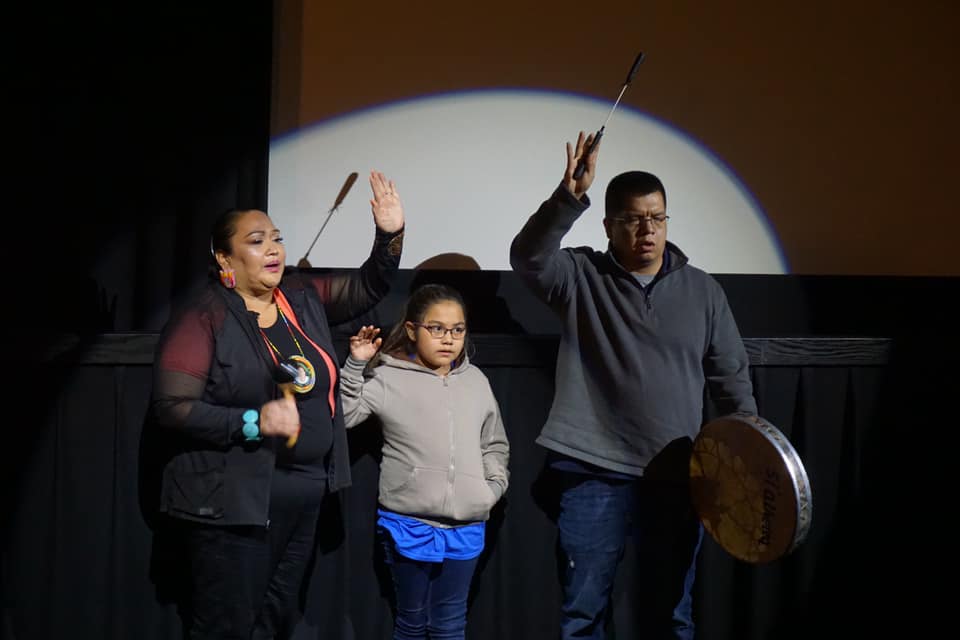
Lummi Nation Tribal Members presenting at the Cascadia Women’s Film Festival. Photo credit: Tara Nelson.
“Our short film submissions are viewed by at least 30 [of our many] jurors and are located all over the world. They include producers, directors, actors, writers, animators, cinematographers, film professors, scholars, and critics, to mention a few. For example, [our jurors might include] a film critic/reviewer in Hong Kong, television producer in Los Angeles, film professor in Washington D.C., archivist at Cinémathèque Française in Paris, film scholar in Rome, actor in New York. About one third of our short film jurors are based in the Bellingham [and] Seattle areas; another third are located elsewhere in the U.S., and another third internationally. Every short film receives three views in the preliminary round.”
The result of such rigor is a series of screened films that achieve the highest level of cinematic excellence—visceral, elegant stories with a careful eye on bringing the full human experience to the screen. Crooks goes on to share that Cascadia partners with other festivals to expand diversity, and that over the past four years, 30% of the films were directed by women of color. This, combined with films by indigenous women, further expand audience horizons — there’s a symbiotic relationship between storyteller and viewer. The storyteller shares a truth — a perspective — and the viewer, in turn, interacts with the film — watches, thinks about, discusses and quite possibly is changed in some way by the story and all its sharp edges. This experience is then shared with others. This is how culture is changed.
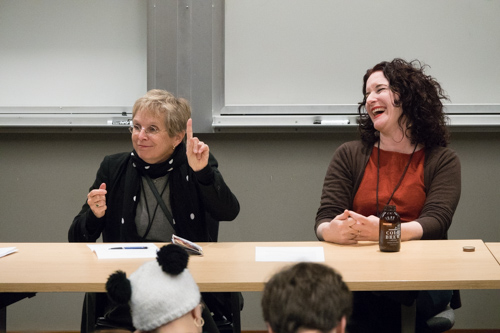
Mary Lou Belli and Tema Staig at a panel discussion for Cascadia Women’s Film Festival.
Much in agreement, Mary Lou Belli — whose latest film America is out now — says that the Cascadia Festival, “makes a huge dent. The numbers are changing, at least in TV. And Film will be next. Cascadia is a front runner for female centric festivals. If you have a film in this fest, it expands your profile and ranking.” Looking back to their early days when only 7% of the top 100 grossing films were directed by women, the Center for the Study of Women in Television and Film at San Diego State University reports that in 2020, 16% of the top 100 grossing films were female-directed. The tide is changing, but there is much work still to be done.
Cascadia International Women’s Film Festival states openly that, “The current flood of stories of sexual harassment and sexual violence against women in the entertainment business frequently point to one principal factor driving this bullying, predatory behavior towards women: the lack of women in decision-making roles.” This does not lie solely in the hands of a few female film mavens from around the world.
Crooks reminds us that “Men play an essential role because their participation in and support of festivals such as ours demonstrate their acknowledgement of the inequity that exists and the need for change. Men have been involved in Cascadia since the beginning, as founders, board members, volunteers, jurors, sponsors and panelists. Their involvement goes a long way to show women, particularly the women directors who come to the festival, that they not only support but actively engage in forwarding the mission. We need both women AND men to make a difference.”
Though some may argue that women – and women alone – should be at the helm, Crook and her team feel otherwise. They contend that the work of equality must be done in tandem with fervent partners that currently occupy the space. In fact, if the work to dismantle the celluloid ceiling is done, seen, and discussed only among women—it’s a moot point and largely relegates women to film as a hobby. There must be cross-gender collaboration and mutual support, to ensure that these efforts aren’t happening in a niche industry bubble. Cascadia enacts these tenets within its leadership structure and festival staffing. Their thirteen-person Board of Directors strategically includes four men. Freida Lee Mock asserts this is a stand-out feature of the growing festival. “Its leadership has a diverse, inclusive group of supporters and thought leaders [who] strongly believe in partnering with a diverse, heterogeneous group of activist leaders to bring women and men together as a force in the region and the world.”
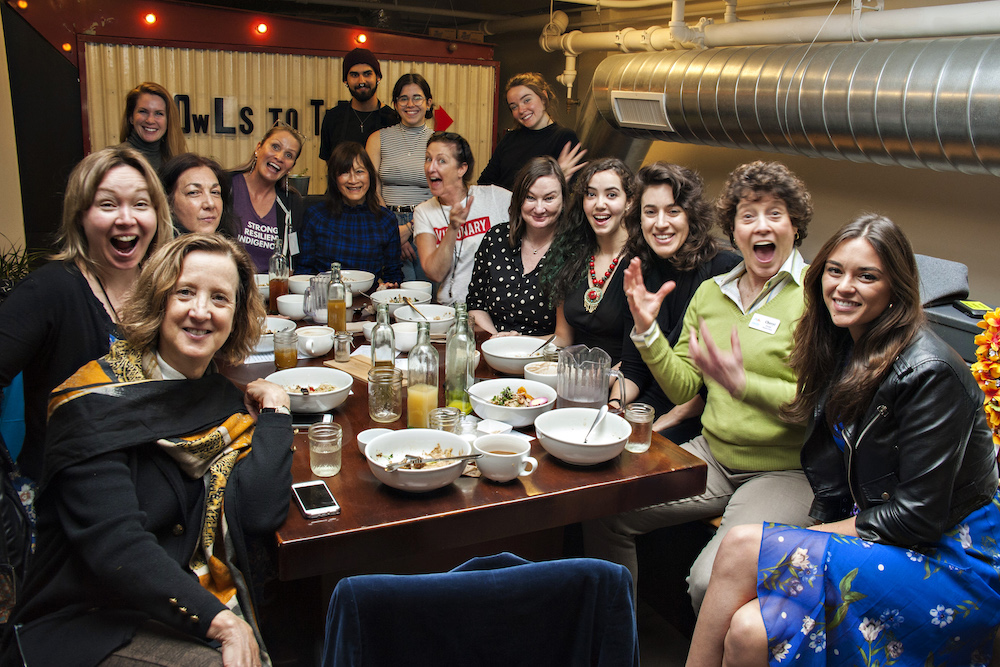
Directors’ brunch at Cascadia Women’s Film Festival.
And women viewers can, as Crooks encourages, “support women-directed films by attending their films. Revenue speaks volumes; financially successful films made by women mean those women will be hired to make more. Supporting festivals, such as ours and others, that showcase films directed by women also can help advance the mission by creating a greater awareness of the films that women make and the need for more.”
There is always the need for more storytelling. Every day, new stories unfold and need to be told. Women — who pioneered film in the early years — need to be in front of as well as behind the camera. They deserve equal opportunity to explore humanity through their worldview — and camera lens. Within the context of this undertaking, Mock is certain of Cascadia’s impact. “[The festival] makes a significant dent by its existence, its own ‘woke’ aspect and thus by being a force by its outreach, its commitment to issues of diversity and inclusion in the industry, especially with the leadership, experience, and commitment of its founding director Cheryl in the national and international area of media.”
And, as is true of all great leaders, Cheryl Crooks is the first to shine a light on the extraordinary efforts of the Cascadia staff and volunteers. Everyone seems to say precisely the same thing —this is a powerful international film community. Women filmmakers—from novice to Oscar-winning — feel the same sense of pride when selected for this festival. It is a benchmark of cinematic excellence.
Though Cascadia 2021 reported a dip in viewership due to pandemic-related “virtual programming fatigue,” the festival crossed a major milestone with its first-ever international festival. Additionally, the virtual Directors’ Networking Brunch was particularly successful. Directors from all the previous festivals were invited to attend and exchanged information and insight with one another.
The 2022 festival is scheduled to be online May 12-15. Past panel discussions and additional content are available year-round as well.
The Atlantic (Naomi)

